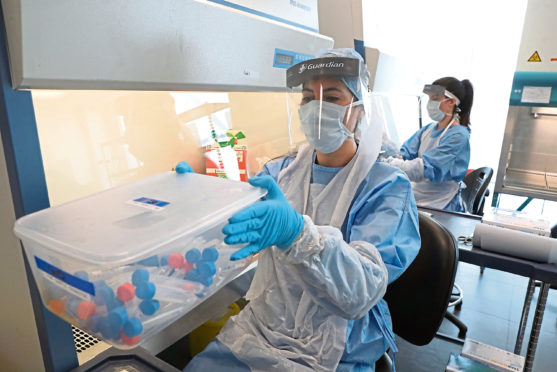
There were 70 deaths in Scotland last week where Covid-19 was mentioned on the death certificate, according to weekly coronavirus figures.
It marks a seventh straight reduction in the number of people dying per week from the virus, as Scotland looks set to see some easing in lockdown restrictions announced tomorrow.
The National Records of Scotland figures, published every Wednesday, include all deaths where Covid-19 is a factor, even when there has not been a positive test.
The data for week 24 (June 8-14) showed that the total number of deaths from coronavirus is now at 4,070.
Additional analysis on coronavirus deaths has also been provided in this week’s data.
A key finding was that people in the most deprived areas were 2.1 times more likely to die with Covid-19 than those living in the least deprived areas.
It was also found that 92% of those who died with Covid-19 in May had at least one pre-existing condition.
The most common was dementia and Alzheimer’s disease, which accounted for 38% of all deaths involving Covid-19, followed by ischaemic heart disease accounting for 11% of all deaths.
The data was also broken down into fields of employment for those of working age.
The highest number of deaths involving Covid-19 of those between 20-64 occurred among process, plant and machine operatives (43 deaths).
2/4 New analysis shows that the occupation with the highest number of COVID-19 deaths is process, plant and machinery operatives which accounted for 43 deaths #NRSStats https://t.co/Ku0qgjLAn2 pic.twitter.com/l6EtoEBq67
— NatRecordsScot (@NatRecordsScot) June 17, 2020
4/4 #NRSStats show that over 90% of people who died from COVID-19 in March – May had a pre-existing condition, in March the most common pre-existing condition was chronic lower respiratory diseases, in April-May it was dementia and Alzheimer’s disease https://t.co/Ku0qgjLAn2 pic.twitter.com/UaYF9Zi8i0
— NatRecordsScot (@NatRecordsScot) June 17, 2020
Pete Whitehouse, Director of Statistical Services, said: “Every death from this virus is a tragedy. These statistics, alongside the other important evidence being made available by the Scottish Government and Health Protection Scotland (HPS), are valuable to the understanding of the progress and impact of the COVID-19 virus across Scotland.
“Today we have published new analysis on mortality by occupation and provided a further breakdown by location to cover smaller areas. We have also included updated analysis on mortality by deprivation, leading causes of death and pre-existing conditions. Our aim is that this will provide important information to help understand the impact of the virus across the country.”
What the NRS figures show
- As of June 14, 4,070 deaths have been registered in Scotland with Covid-19 mentioned on the death certificate
- There were 70 deaths in week 24 (June 8 to 14), 19 down from week 23 (June 1 to 7)
- This marks the seventh weekly reduction in a row, and the lowest weekly total since late March
- Deaths involving Covid-19 accounted for 7% of all deaths registered in week 24, a steadily falling proportion from a peak of 36%
- 47% of Covid-19 deaths registered to date related to deaths in care homes
- 46% of deaths were in hospitals and 7% of deaths were at home or non-institutional settings
- Half of Covid-19 deaths in week 24 took place in care homes (35 deaths)
Why this data differs from daily updates
The weekly figures differ to the daily numbers announced by Nicola Sturgeon at her press briefings as they also include deaths where there has not been a positive test for Covid-19, but it is a suspected or presumed factor.
The First Minister’s daily figures only record deaths of patients who have tested positive for coronavirus.
Scottish Government Covid-19 statistics, June 17:
2,462 deaths (+9)
18,066 confirmed cases (+21)
965 in hospital (-21)
24 in ICU (+5)Latest updates
:https://t.co/IkWftPJGFN
— The Sunday Post (@Sunday_Post) June 17, 2020
Live updates

Enjoy the convenience of having The Sunday Post delivered as a digital ePaper straight to your smartphone, tablet or computer.
Subscribe for only £5.49 a month and enjoy all the benefits of the printed paper as a digital replica.
Subscribe